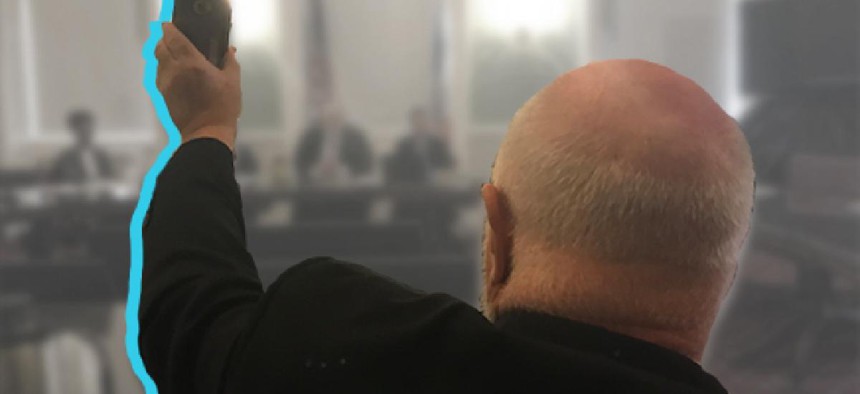The latest from Center for Court Innovation ... NYC contracts ... Good Shepherd Services

Monsignor Kevin Sullivan at a New York City Council hearing Illustration by Zach Williams
A new report examines the effect of a proposed change to the public-charge rule. Currently, non-cash benefits such as SNAP have not had a role in determining whether a person is defined as a public charge, according to a report published in the New England Journal of Medicine. But the research, conducted by Russell Sage Foundation trustee Hirokazu Yoshikawa and former visiting scholars Krista Perreira and Jonathan Oberlander, sees something in the works that could have far-reaching consequences for who gets to become a citizen, and who might avoid applying for public benefits.
“The potential impact of these changes is enormous,” reads the report. “In 2016, about 43.7 million immigrants lived in the United States. If enacted, the new regulations would affect people seeking to move to the United States to be reunified with family members and to work, as well as lawfully present immigrants who hope to become legal permanent residents.”
Some nonprofit folks had something to say about a new bill that would require more transparency from New York City agencies during the procurements process. Basically, agencies would have to alert nonprofit contractors about the reasons for delays in contract approvals and payments, the New York Post reports.
Allison Sesso, executive director of the Human Services Council, said this in an Aug. 8 statement:
The very existence of many human services providers is at risk because our city government fails to pay them on time. These late payments are undermining the work these nonprofits do to provide food, shelter, health care and other vital services to New Yorkers — it's unacceptable and needs to change.
We're thrilled to see Councilmembers Brannan and Lancman sponsoring this legislation, which would be an important step forward in addressing this crisis. This legislation will increase transparency and accountability, allowing providers to diagnose issues and provide more efficient service for greater numbers of New Yorkers.
Wayne Ho, executive director of the Chinese-American Planning Council, also had some thoughts on the matter that he expressed in an Aug. 8 statement:
From being awarded by the city agency all the way through registration at the Comptroller’s Office, nonprofits struggle to figure out why their contract has not been registered, why payments are delayed, and why they must take out costly lines of credit just to carry out city-mandated services. While other cities register their contracts in weeks and days, New York City takes months, if not years.
This bill becomes particularly important for the Asian American community, as the fastest growing community in New York City does not receive an equitable share of public or private funding. Unlike other contracted social services organizations, Asian American organizations do not have a fair share of foundation grants or corporate sponsorships to use in order to float expenses until city-contracted funding is received.
The work of the Center for Court Innovation was featured on Terry Gross’ NPR program, “Fresh Air.” The episode features a discussion on a community court program that is run jointly by the nonprofit and the city of Newark.
“Alternatives to jail are important to Judge Pratt and Julian Adler because, as Adler and his co-author write, jails are accelerants of human misery,” reads a transcript of the episode. “If you are poor or mentally ill or struggling to keep your family together when you enter, the chances are that all of these conditions will be markedly worse when you come out.”
Hear the episode or read the transcript here.
Nonprofit Good Shepherd Services has secured a $14.77 million contract renewal with the New York City Administration for Children’s Services. The money will fund “non-secure placement services,” according to the City Record. Samaritan Village, meanwhile, has two new contracts with the city Department of Homeless Services. A $20 million contract will fund a shelter for homeless adults at 225 East 53rd Street in Manhattan through June 2022, while a $28.3 million contract will fund a shelter at 988 Myrtle Avenue in Brooklyn over the same time period.
Send your press releases, photos, and word of your latest happenings to reporter Zach Williams at zwilliams@nynmedia.com.